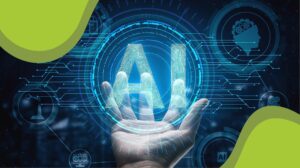
The share of EU residents aged 16-74 who used generative artificial intelligence tools (such as ChatGPT, Gemini, Grok, etc.) in 2025 was 32.7%, according to the European Union’s statistical service (Eurostat).
According to Eurostat, such services were most often used for personal purposes (25.1% of respondents), less often for work (15.1%) and formal education (9.4%).
Among EU countries, the highest prevalence of generative AI use was recorded in Denmark (48.4%), Estonia (46.6%), and Malta (46.5%), while the lowest rates were recorded in Romania (17.8%), Italy (19.9%), and Bulgaria (22.5%).
According to Euronews, citing European statistics, in a sample of 33 European countries, the highest level of use was recorded in Norway (56%), and the lowest in Turkey (17%); The group of countries with penetration above 40% included Denmark, Estonia, Malta, Iceland, Finland, Croatia, Belgium, Sweden, Slovakia, Lithuania, the Netherlands, and Switzerland.
Ukraine does not appear in this European comparison. At the same time, according to a KIIS survey (fieldwork period: February 14-March 4, 2025), 26% of adult Ukrainians had practical experience using AI, with 17% doing so regularly (including 12% daily or almost daily).
Source: https://expertsclub.eu/32-zhyteliv-yes-u-2025-roczi-vykorystovuvaly-shi/

France’s Schneider Electric plans to buy back €2.5-3.5 billion worth of its own shares by the end of 2030.
The company expects to increase the profitability of its operations amid the development of the artificial intelligence market and growing demand for electrification solutions.
According to a press release from Schneider Electric, the company aims to increase its adjusted EBITA margin by 250 basis points in 2026-2030. Its previous target was to increase this figure by 50 basis points in 2024-2027.
Schneider Electric will seek to “capitalize on opportunities in the areas of electrification, automation, and digitalization,” said its CEO Olivier Blume, whose words are quoted in a press release published ahead of an investor event.
The company forecasts average annual revenue growth of 7-10% through 2030. In addition, it plans to sell assets with proceeds of €1 billion to €1.5 billion during this period.
Schneider Electric is a manufacturer of distribution and protection equipment, automation devices for the energy sector, and other equipment.
Its solutions play an important role in ensuring the operation of data centers.
Schneider Electric shares added 2.5% in price on Thursday trading in Paris. Since the beginning of this year, their value has fallen by less than 1%.

Apple has unveiled the new generation of its flagship smartphone, the iPhone 17.
The key features of the new product are: a screen with a refresh rate of 120 Hz — providing a smoother image and a comfortable gaming experience,
a 6-core Apple Silicon A19 processor — a new generation chip focused on high performance and energy efficiency, an anti-glare display coating — allowing for more comfortable use of the device in bright sunlight, and built-in Apple Intelligence artificial intelligence — a system of personalized AI features integrated into the smartphone’s interface and applications.
Apple positions the iPhone 17 as a device that ushers in a new era in mobile technology, emphasizing intelligent features: adaptive recommendations, on-device data processing without sending it to the cloud, and support for generative capabilities.
Analysts note that the integration of Apple Intelligence could become a competitive advantage in the battle with Android smartphones, where AI features are already being actively used by the largest manufacturers.

The mining and metallurgical group Metinvest is transforming its business processes with artificial intelligence (AI) through automation, the use of drones, and the application of these tools in the financial sector.
“In 2020, we were able to automate about 70% of our processes, with 30% remaining inaccessible due to technological limitations. Today, this figure has risen to 95%. This opens up completely new opportunities, and we are actively moving in this direction,” said Anton Ishchenko, head of the R&D product development team at Metinvest Digital, at the 13th Annual Forum of Financial Directors of Ukraine in Kyiv.
According to him, in five years of working with intelligent process automation, more than 500 solutions based on various technologies have been implemented, which has made it possible to automate about 200,000 hours of work, equivalent to approximately 100 full-time employees.
He noted that modern intelligent automation at Metinvest is based on a combination of RPA (routine operation robotization), low-code platforms (rapid solution development without complex coding), Process and Task Mining (process analysis to identify inefficiencies), and AI (automation of complex tasks and real-time data processing).
One of the main innovations is the active involvement of employees in the automation process. At Metinvest, employees independently record their business processes and work activities using Task Mining, Power Automate, and SAP Scripts. This allows for the formation of high-quality and structured automation requirements from the ground up, reduces the workload on business analysts, and speeds up the transition from idea to finished solution. The collected data and processes are analyzed automatically using AI and then quickly transformed into working automated scenarios. As a result, the time and resources spent on development and implementation are reduced by tens of percent. In the context of limited business budgets, this approach has become extremely important, emphasized Ishchenko.
The result of this practice is the creation of the Application Warehouse corporate platform, a centralized repository of universal applications for automating typical business processes in various departments of the company. This significantly increases the availability of digital tools: new solutions are quickly implemented, distributed among employees, and do not need to be developed from scratch for each task. Currently, about a thousand employees use the platform.
“We continue to invest in research and development to create business value and remain among the leaders in digital transformation,” Ishchenko concluded.
In turn, the group’s CFO, Yulia Dankova, pointed to the comprehensive implementation of computer vision and intelligent document processing technologies in the company’s financial and production processes. According to her, modern solutions based on Computer Vision enable instant reading, analysis, and classification of documents from various sources, from scanners to corporate mail, without the need for prior training.
Since 2023, Metinvest has been using its own intelligent document processing system, myOCR. The platform, which processes up to 40,000 pages of documents per month, including confidential ones, has been implemented at seven large enterprises of the group. It saves about 20,000 hours of working time per year and is integrated with a universal translator from foreign languages into Ukrainian. It contains modules for identifying stamps, signatures, contextual analysis, document classification, data verification, and extraction. At its core are advanced AI models.
“For example, a company is importing goods from an Italian factory. The automated process receives a package of documents in Italian and English, compares them with the accounting system data, generates an authentic translation into Ukrainian, adds it to the package, and transfers it to the electronic document storage system. For financial departments, this has been a real breakthrough in the speed and convenience of document flow,” said the CFO.
The CFO added that the company has implemented a unified solution for SPAIS computer vision systems. This system helps to identify safety violations in production, such as employees being in hazardous areas or without personal protective equipment. When a violation is detected, the program signals it and stores the data in the appropriate systems. This solution is already being used at several Ukrainian enterprises of the group. SPAIS also helps detect damage at Metinvest’s production facilities using drones.
Another solution from the family of computer vision systems at Metinvest enterprises, which has undergone pilot testing and is being implemented for industrial use, is automatic slab quality control.
Dankova emphasized that the group’s assets operate exclusively on proven, uncompromised licensed systems. Microsoft solutions and in-house developments based on the Microsoft technology stack are recognized as priority technologies in this area.

According to SERBIAN ECONOMIST, in April 2025, French company Eviden, part of the Atos group, signed a €50 million contract with the Serbian Ministry of Information Technology and Electronic Governance to establish a National Artificial Intelligence Factory (AI). This project aims to accelerate the development of AI in the country and strengthen technological autonomy using European technologies.
A comprehensive approach to AI development
The National AI Factory will consist of a Center of Excellence and a supercomputing platform designed to support innovation in key sectors such as healthcare, energy, transportation, and public administration. The project will provide access to these resources for government agencies, academic organizations, and businesses.
Technical infrastructure
The project will install a BullSequana XH3000 supercomputer, designed and manufactured at Eviden’s flagship factory in France. The system has a computing power of up to 25 petaflops, includes 300 graphics processors and 2.5 petabytes of data storage. This supercomputer will form the basis of the Center of Excellence, providing the necessary computing power for the development and implementation of innovative AI solutions.
Eviden
In addition, the BullSequana AI software platform will be deployed to accelerate the development of AI applications. The software layer will integrate Mistral AI technology, which provides cutting-edge European generative AI models to support breakthrough solutions.
– International cooperation and training
The project will involve AI experts from Eviden teams in France, the Czech Republic, and Serbia. These experts will ensure the effective application of AI in Serbia’s strategic sectors and will also participate in the recruitment and training of engineers and academic staff across the country, helping to transform the Center of Excellence into a self-sufficient innovation hub.
– Statements from officials
Mihailo Jovanovic, Director of the Information Technology and E-Government Directorate of Serbia, said:
EdTech Innovation Hub
“This partnership with Eviden, a leading European player in supercomputing and AI, is a historic moment for the digital future of our country, demonstrating the spirit of Franco-Serbian cooperation. It is not just a technological leap forward, but also a statement of our commitment to stimulating innovation, developing our economy, and strengthening our position as a regional leader in AI.”
Source: https://t.me/relocationrs/959